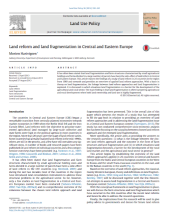Land Library Search
Through our robust search engine, you can search for any item of the over 73,000 highly curated resources in the Land Library.
If you would like to find an overview of what is possible, feel free to peruse the Search Guide.
/ library resources
Showing items 64 through 72 of 131.This chapter uses both classic and contemporary literature to trace how land policies, and particularly land reform, have gained, lost, and regained prominence in development strategies and debates since the Second World War.
This article reviews recent research on contemporary transformations of global land governance.
In 1978, the rural reform began in China, and since then farmers, including the poor ones, have benefited from a steady growth in income and gradually strengthened food security.
The rubber tree is native to the humid tropics and has traditionally been cropped in the equatorial zone between 108Nand 108S; in mainland Southeast Asia this includes portions of southern Thailand, southeastern Vietnam, and southern Myanmar.
It has often been stated that land fragmentation and farm structures characterized by small agricultural holdings and farms divided in a large number of parcels have been the side-effect of land reform in Central and Eastern Europe.
Developing countries are facing a number of challenges in search of development. Various policies and strategies have been formulated and many are already in the process of implementation in different countries. Among the policies are National Land Policies (NLP).
Agriculture sector growth has made a
powerful contribution to post-war economic recovery in
Tajikistan, accounting for approximately one third of
overall economic growth from 1998 to 2004. Sector output
In the year 2000 the government of Zimbabwe launched the Fast Track Land Reform Programme (FTLRP) as part of its on-going land reform and resettlement programme. The main premise of the programme is to address the racially skewed land distribution pattern inherited at independence in 1980.
This IFC SmartBook is a compilation of sixteen IFC SmartLessons that presents practical lessons learned by staff from across the IFC and the World Bank on approaches for engaging in agriculture that have led to success.








